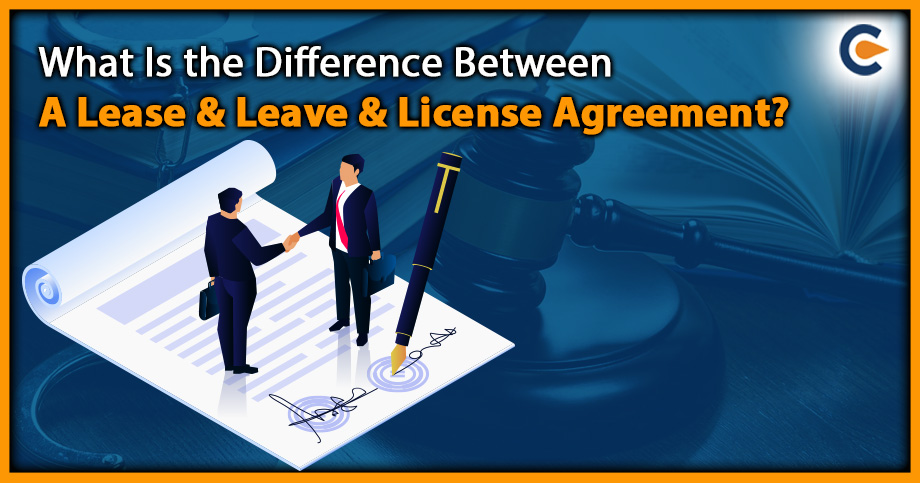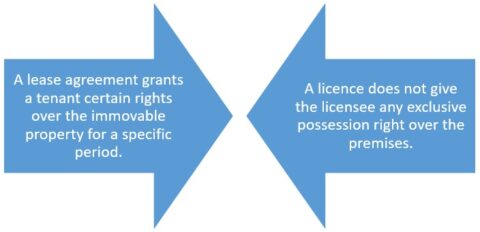Commercial real estate documentation is tantamount to the successful operation of your real estate business. It is imperative that the documents created by the professionals helping manage your property should be thoroughly vetted, edited, reviewed, and analyzed by competent professionals. Most commercial property owners have real estate attorneys combined with sophisticated commercial real estate brokers assisting them in the creation of their building documentation. Veering off that course can lead to unintended circumstances.
A recent case of Castaic Studios, LLC v. Wonderland Studios LLC, the California Court of Appeal rendered a decision pertaining to the eviction process in commercial real estate. The ruling establishes that when a property owner extends only a license (just like a ticket to a ballpark), rather than a lease, for the use of real property, the owner cannot resort to California’s summary eviction process, unlawful detainer, against the defaulting party. Franc (2015) 233 Cal. App. 4th 744, 758-759.

This case centered around a written agreement between Castaic and Wonderland, wherein Castaic granted Wonderland the “exclusive right to use” specific areas of its commercial property. The agreement explicitly identified itself as a “license agreement” rather than a lease, with Castaic retaining legal possession and control of the premises. Furthermore, the agreement stipulated that it would be “governed by the contract laws and not by the landlord tenant laws.” At the time of drafting this agreement it was not anticipated that a breach would lead to a Court of Appeals published decision.
When Wonderland defaulted on the agreement, Castaic initiated an unlawful detainer action seeking possession of the property. However, the trial court dismissed the lawsuit, citing that Castaic had effectively waived its right to pursue the remedy of unlawful detainer.
Key Agreement Provisions that Influenced Court
Section 6 of the agreement states, “[t]his agreement is not a lease or any other interest in real property. It is a contractual arrangement that creates a revocable license. Licensor retains legal possession and control of the Premises and the area(s) assigned to Licensee. Licensor has the right to terminate this Agreement due to Licensee’s default. When this Agreement is terminated . . . the license to use the Premises is revoked. Licensee agree[s] to remove Licensee’s personal property and leave the area(s) as of the date of termination. Licensor is not responsible for personal property left in the area(s) after termination.”

Section 12.1 outlined the conditions for default, “Licensee is in default . . . if: Licensee does not pay the required amount payable . . . hereunder on the designated payment date and after written notice of the Licensee’s failure to pay, Licensee does not pay within 3 days after the date of such notice . . . . If Licensee defaults on Licensee’s obligation under this Agreement, Licensee agrees that Licensor may cease to provide . . . access to the Licensee’s area(s) of use without notice or the need to initiate legal process.”
Section 13.3(a) provides that if Wonderland defaults, Castaic may “immediately terminate Licensee’s right to use of the Premises by any lawful means, in which case Licensor’s obligations under this Agreement shall immediately terminate and Licensor shall have option to immediately take over use of the Premises from the Licensee.”
Section 29 explicitly states that the agreement will be governed by contract laws and not landlord-tenant laws, reiterating its nature as a contractual arrangement and not a lease.
Unlawful Detainer is a Remedy for Breach of Lease, Not a License
The Court of Appeal emphasized that the cause of action for unlawful detainer is intended for breaches of leases, providing an expeditious remedy for the recovery of possession. In this case, the agreement’s designation as a license, coupled with explicit waiver provisions, precluded Castaic from pursuing an unlawful detainer action.

The court underscored the significance of language explicitly stating that the agreement is not a lease but a contractual arrangement creating a revocable license. Despite the subtle nature of distinguishing between a lease and a license, the multiple provisions in this agreement clearly indicated the waiver of Castaic’s rights to utilize the unlawful detainer procedure in favor of the termination language of the license agreement.
The drafter of this agreement obviously did not anticipate the potential problem which this License Agreement led to, nor did they have any idea this case would end up in a published appellate decision. This ruling underscores the importance, when drafting agreements for commercial real property use, of considering how the property owner can assert its rights in the event of evicting a defaulting user. In this instance, the owner was constrained from utilizing the most efficient and expeditious method to remove the defaulting user from the property.
The Court of Appeal also explained that the cause of action for unlawful detainer “is a remedy available to a landlord against a tenant who breaches a lease and is ‘intended and designed to provide an expeditious remedy for the recovery of possession of real property.’ Again, in this case, not only had Castaic designated its arrangement with Wonderland as a license and not a lease, but the terms of the license agreement described above waived any right for Castaic to file an action for unlawful detainer. The Court focused on the language which provided that the agreement will be governed by the contract laws and not by the landlord tenant laws, and that “this agreement is not a lease or any other interest in real property. It is a contractual arrangement that creates a revocable license.”
The Court noted that whether an agreement is a lease or license “is a subtle pursuit.” It also noted that regardless of the distinction, in this case, because of the multiple provisions which waived the rights of Castaic to be a landlord having the benefits of the unlawful detainer procedure, that Castaic could not pursue such a claim.

Competent Commercial Property Managers Can Draft Agreements
Therefore, when drafting agreements with respect to use of real property, one of the important issues to keep in mind is how the owner or investor can assert its rights to evict a defaulting user of the real property. In this case, the owner was precluded from using the easiest, quickest method to remove the defaulting user from the property. Commercial property managers and owners alike need to be prudent and exercise care when drafting agreements and can affect an owner’s ability to seek redress and remedies.
Commercial building owners looking for a professional, dependable, and law-abiding property management partner, Esquire Property Management Group (ESQPMG) is here. Landlords and commercial property owners are encouraged to ensure the professionals drafting documents for them understand the importance of the documents that they rely upon. ESQPMG has two real estate attorneys on staff and daily ensures the properties and tenants they manage are held to higher standards. We won’t mistake a license for a lease – we guarantee it.
David currently is the broker/owner of several real estate related businesses which manage and maintain 300+ client properties on the San Francisco Peninsula.
Trust, transparency, and performance guarantees are the foundation of these businesses. David challenges anyone to find a PM professional that offers services similar - extensive education, customer service, and performance guarantees.
David also provides consulting for his clients on property development feasibility, construction, and complex real estate transactions.
David has authored a published law review article, two real estate books, and over 120 real estate blog articles.
- Do You Know WALT, the Commercial Real Estate Guy? - January 10, 2024
- Commercial Real Estate – Binding Letter of Intent, Or Not? - December 18, 2023
- Commercial Tenant Risk Mitigation, Insurance, Tracking, and Best Practices - December 12, 2023

